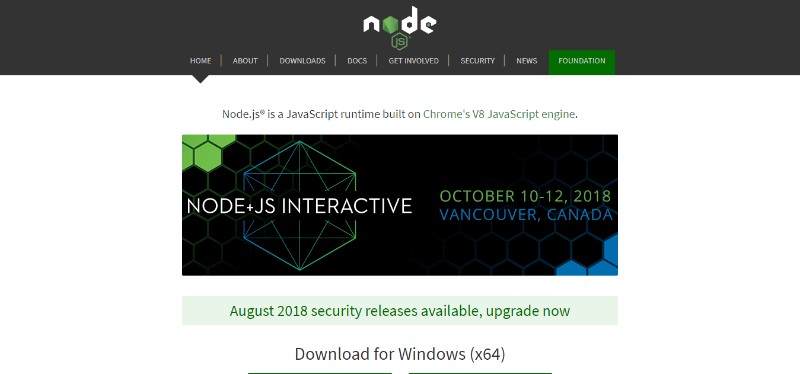Why use Node.js? Developers choose to use Node.js because it brings into play the pioneering push technology to replace WebSockets, unlike other similar web applications.
To understand why use Node.js versus other similar applications, you must first understand what node.js is as well as the node js advantages. Node.js is an open-source, cross-platform JavaScript run-time environment that executes JavaScript code outside of a browser.
The best thing about Node.js is that it allows you to build web apps that are equipped with real-time, two-way connections so that the client and the server can both initiate communication, subsequently enhancing the exchange of valued data.
The traditional web response concept/archetype only allows for communication to be initiated by the client. With Node.js, you can build and operate a full spectrum of web apps. In many ways, Node.js does what Spring Framework, Ruby on Rails, and ASP.NET do.
The main language for Node.js is JavaScript. Plus, the Node.js server technology utilizes a wide variety of plugins that are managed through the NPM or the Node Package Manager. This allows you to create custom apps that are tailored to your specific needs.
Understanding the power and flexibility of Node.js might encourage you to invest in Node JS development services and hire Node JS developers for your project, thereby taking full advantage of the platform’s potential.
Why use Node.js and not some other web technology? The answer is simple. Node.js comes with a set of features that NodeJS developers for hire seem to prefer when creating web apps. Here are some of them:
- JavaScript throughout
Why Node js? Well, Node.js is such a popular choice among developers mainly because it utilizes JavaScript as its main language. Most developers are already familiar or even experienced in JavaScript, which makes Node.js easy to adjust to and adapt.
The transition from different web technology to Node.js is, therefore, a light transition without significant obstacles given the widespread nature of JavaScript as a programming language. Plus, JS remains the only way to create web apps inside the browser.
- Super-fast
Set in motion by V8, Node.js is essentially a JS run-time environment. Google’s development to be used in Chrome, V8 can compile and execute JS superfast because it compiles JS into native machine code.
The event loop of Node.js is a single thread that performs all I/O operations asynchronously, i.e., when an app must perform an I/O operation, the app will send asynchronous tasks and call-back action to the Node.js event loop while completing the rest of the program.
After the sync operation is completed, the magic event loop of Node.js goes back to the task to execute the callback action. Thus, Node.js is unique because conventional event looping takes up a lot of memory and is extremely difficult to implement.
If you are still wondering why use Node.js, remember that Node.js executes at lightning speed reading and writing the file system to network connections, file system, and database. The result? The fast building of greatly scalable network apps able to handle vast amounts of concurrent connections due to its high throughput.
- Lightweight
Since it is based on an event-driven design, every call, and operation executed on Node.js as a series of asynchronous callbacks, which means that Node.js can run on a single thread without the need for a new thread to be spawned for every new client request.
This capability makes Node.js lightning fast and lightweight creating the basis for the non-blocking I/O feature of Nod.js.
- One language in all layers

If you still wonder why to use Node.js, check this great feature out! Most web technologies entail knowing two coding languages: one for the server-side and one for the client-side. With Node.js, you don’t need to know two languages; you only need to know JavaScript and use it across layers. Furthermore, the language is re-usable.
- High performance
Node’s high performance has been demonstrated by some of the world’s giants, including PayPal, Walmart, and LinkedIn. PayPal reports reducing response time by 35% and doubling the number of requests. Walmart’s server didn’t go over 1% CPU on Black Friday in 2013 with over 200,000,000 users online. LinkedIn reports going from 30 to 3 servers after moving from Ruby to Node.js.
- Host it anywhere
Given Node’s growing popularity and extensive use, many web servers and cloud-based hosting providers support Node-based applications, including Amazon AWS, Google, Microsoft IIS, Heroku, Microsoft Azure, and more.
- Easy to alter and maintain
Many applications crash because they are fed too many new requirements, and they can’t cope with the added stress. They tend to get rigid and lose their adaptiveness because they are haven’t been built to perform under so much stress.
Node.js is different. Instead of creating a large application, it allows you to build several small apps, which lets you implement changes or even enhance functionality a lot easier just because you don’t need to go into the code-base to make those changes.
- Real-time data streaming

There are so many reasons when it comes to why to use Node.js instead of other solutions. Real-time data streaming is one of those reasons because it lets developers create great features, including the ability to process files as they are uploaded, which is time-efficient.
Real-time data streaming is a beneficial characteristic that programmers/developers use when they work on real-time audio encoding or video encoding.
- Working as a proxy server
Packed with a set of useful features, Node.js works like a proxy server for services that have different response times. Furthermore, if you are still wondering why use Node.js, think about the fact that you stream data from various sources when you choose Node.js.
- Great community support: NPM
Support is essential, and Node.js is supported by a large community that continually focuses on improving Node.js. Communities offer many code modules and packages to help developers create web applications.
There is an online archive called NPM, or Node Package Manager, where developers can access published Node.js projects. The packages in NPM offer reusable codes – as much as 650,000 of them – that you can put together to create a project as per your requirements.
- Winning database queries

It’s easy to combine Node.js with new NoSQL databases, including CouchDB or MongoDB because database queries are written in JS. Node.js doesn’t require data conversion due to the JSON stored date format. Therefore, conversions from JSON to binary modules are out of the equation with Node.js, unlike Ruby on Rails.
Summary
With Node.js’ increasing popularity and great possibilities, developers are enabled to create robust and highly scalable applications. You must take advantage of the trendiness that node.js has today because you never know when things change in web development.
There are too many business advantages, so you can’t afford not to take Node.js into account. Developers can now use Node.js to create the most extraordinary web applications easily and quickly, which makes Node.js a very trendy JS run-time environment.
If you enjoyed reading this article about Node.js, you should also read these:
- How to avoid software bugs
- How to Choose a Good Software Development Company
- Cross platform mobile development or native app: Which to use?
- Web Application Testing: Step by Step Process to make it Right - March 22, 2023
- 9 Web Technologies Every Web Developer Must Know - March 17, 2023
- Web Application Development: Resources, Best Practices, and How to do it - March 12, 2023








